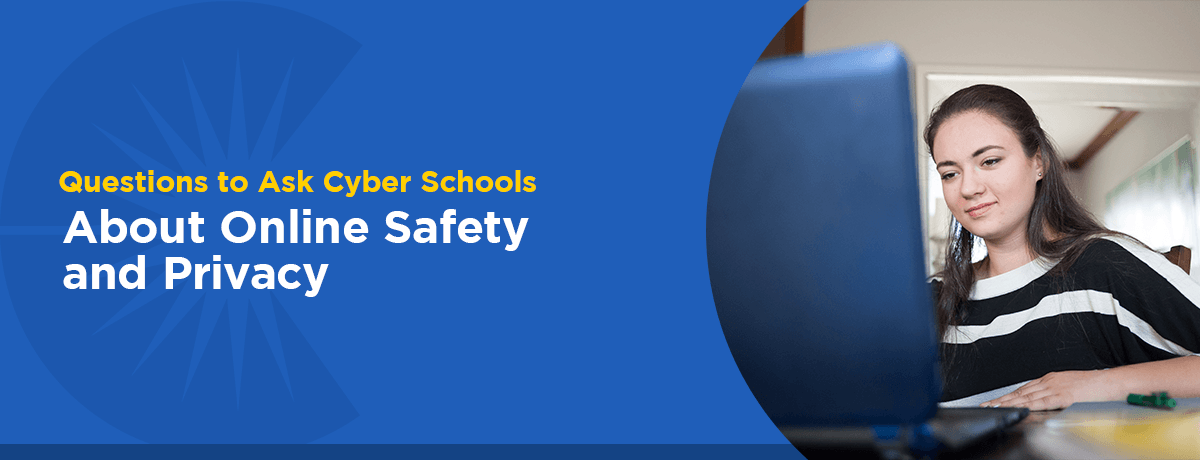Enrollment Now Open for Second Semester. Click Here
Enrollment Now Open for Second Semester. Click Here

As technology advances and an increasing number of people rely on the internet for everyday tasks, more information about an individual’s life ends up online. If you’ve ever used a computer or cellphone to connect to the internet, you’ve probably noticed websites requesting your personal information. After you’ve entered all the details, you may wonder where what you typed ends up and if websites can store or sell that data.
It’s important to be mindful of the websites you rely on and the information you provide — and the same goes for your child.
Enrolling a student in cyber school calls for personal information and detailed answers, so you’ll want to be sure to choose a reliable school with a secure website. Here are some of the questions you should ask your child’s potential cyber school to ensure you understand the technology, safety and privacy policies set in place to protect you and your child.
There are laws in place to protect your student’s privacy, so schools should be able to answer questions about data collection easily. Ensure that the school complies with the Family Educational Rights and Privacy Act (FERPA), which requires schools to notify parents about what information they collect, such as any details about a student’s identity, educational records, medical history, and family information. Make sure you know how the school stores this information and that there are safety protocols in place to prevent leaks.
Parents may not realize that the security and privacy of their child’s information can become compromised through the school directory. Under FERPA, schools receiving federal funding have the right to share student information with third parties. Directories can have detailed information, including your child’s name, date of birth, home address, email address, and photos.
While schools do not need to obtain parents’ permission to collect and share this data, they do give parents the choice to opt out of consenting to their child’s information being made public or put in the directory. Schools must provide public notice of what information will appear in the directory, and they should have parents sign a consent form detailing exactly which information is public and who can access the information provided.
Schools often hire third-party vendors, contractors, or service providers to handle services they cannot adequately provide on their own. These can include cloud storage providers, online education programs or applications, assessment tools, management systems, and student information portals. Ask the school for the names of the third parties they use and research them to confirm their validity and reliability.
Here are some additional questions to ask regarding third-party vendors and data security:
Schools should be able to answer questions about any software or apps they use in their educational system. They should review all privacy policies and fine print regarding educational software before bringing it into the curriculum. Schools will ideally find that the software encrypts all stored data and that all accounts are password-protected.
Schools might also take advantage of third-party vetting processes from security companies to ensure the software and apps they use have solid reputations with tight privacy policies that will help keep your child’s information secure.
When you put information on the internet in any capacity, there are safety risks involved. The first step in lowering these risks is being aware of the school’s protocols.
The technologies schools use continue to advance, and cyber schools rely heavily on the internet. It’s important for students, parents, and faculty to understand the risks that come with supplying personal information to online services. Part of a cyber school’s introductory meeting for potential students and their families should include an orientation that provides education about the safety risks of the internet and the emergency protocols the school has in place.
The school should also have a designated place where anyone associated with the school can access information about security and privacy policies and what to do if a breach occurs. The school should appoint a person or group of people to head online security and direct any questions or concerns to them.
While any online company or program wants to guarantee the safety of its users, the reality is that all websites risk data breaches and security leaks. It’s important for you to know that the school has a cyber attack response plan.
The quicker the school can identify an attack and put its security plan into action, the less of a risk there is for the leak of private information. Schools should notify students, parents, and staff about any cyberattacks immediately, citing the source of the breach and their plans to prevent future attacks.
Asking these questions before enrolling your child in a cyber school is an important part of the process of making sure the school is a good fit for your child. At Commonwealth Charter Academy (CCA), we provide a safe online environment using technology to create a customized learning experience to benefit each student. We help prepare students and their families for graduation and the paths they choose beyond school.
If you choose to enroll your student with CCA, we will also pair you with a family mentor who will help you adjust to online learning.
Give us a call at 844-590-2864 to learn more. If CCA sounds like a good match for your student, enroll today!
Enrollment Now Open for Second Semester. Click Here